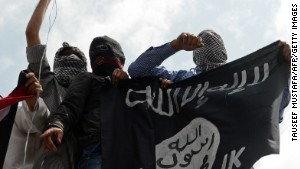Washington (CNN) — President Barack Obama has yet to decide whether to authorize air strikes against ISIS targets in Syria, the White House insists.
More and more, though, the signals and nuance from the administration and the military suggest such a campaign could be coming.
Here is a look at signs the United States could be planning to expand air attacks on the Sunni jihadists rampaging through northern Iraq:
 ISIS growing stronger, more capable
ISIS growing stronger, more capable
Look before you launch
A U.S. official told CNN that Obama has authorized reconnaissance flights over Syria that are seen as a forerunner of possible U.S. airstrikes there against ISIS, which calls itself Islamic State.
At the same time, the U.S. military and intelligence communities are gathering information on the locations of ISIS leadership and troop concentrations in Syria, according to two U.S. officials.
Obama authorizes reconnaissance flights over Syria, U.S. official says
Pentagon spokesman Rear Adm. John Kirby, speaking generally, told CNN on Monday that “you certainly want to get as much of a view on the ground as you can, as much situational awareness as you can” in order to conduct operations in Syria.
Laying the groundwork
Obama’s top military man, Joint Chiefs Chairman Gen. Martin Dempsey, last week provided the fundamental reasoning for going after ISIS in Syria.
“Can they be defeated without addressing that part of their organization which resides in Syria? The answer is no,” Dempsey told reporters. “That will have to be addressed on both sides of what is essentially at this point a nonexistent border” with Iraq.
The U.S. military began airstrikes against ISIS positions in Iraq earlier this month, helping Kurdish and Iraqi forces halt the Islamic extremists’ murderous advance.
One reason given by the administration for the aerial campaign was to protect military advisers previously sent to Iraq to work with Iraqi and Kurdish forces.
5 key questions in the fight against ISIS
The same rationale of protecting U.S. personnel and interests can be applied to expanding airstrikes across the border easily exploited by ISIS.
“While the President has not made a decision to take additional military actions at this time, we don’t restrict our options by geographic boundaries when it comes to the central mission of protecting our people,” National Security Council spokeswoman Caitlin Hayden said Monday.
Now the question becomes establishing that ISIS poses a direct threat and building enough international and domestic support to act.
The video of ISIS beheading American journalist James Foley helps make the case, as does the estimated 2,000 or so foreigners including Europeans and Americans fighting for ISIS who could return home.
Obama will host a meeting of leaders of the U.N. Security Council next month to discuss the threat of foreign fighters in ISIS.
Going into Syria
Last week, his former point man on Syria, Frederic Hof, told CNN that a failed U.S. mission to rescue Foley earlier this year established a precedent of American forces entering Syrian territory without government permission.
On Monday, White House spokesman Josh Earnest cited the U.S. mission that killed Osama bin Laden in Pakistan as another example of going into a country without government permission to protect the safety or interests of Americans.
In a speech Tuesday to the American Legion, Obama mentioned increased U.S. assistance for Kurdish forces in Iraq fighting ISIS as well as moderate opposition forces in Syria battling both ISIS and the government of President Bashar al-Assad.
By lumping together the Kurds and Syrian opposition, Obama signaled his view of the conflict as a regional one regardless of the two countries involved.
Defense Secretary Chuck Hagel later announced that seven countries had joined the United States in providing “urgently needed arms and equipment” to the Kurdish forces. Those are: Britain, France, Italy, Canada, Denmark, Croatia and Albania, he said.
“Operations have already begun and will accelerate in the coming days with more nations also expected to contribute,” Hagel’s statement said.
Is Obama heading toward airstrikes in Syria?
Regional support
At the American Legion national convention, Obama also touted the nation’s ability to galvanize international coalitions to respond to crises.
“History teaches us of the dangers of overreaching and spreading ourselves too thin, and trying to go it alone without international support,” he said.
According to Hof, an Atlantic Council senior fellow, the President would seek such international support now to take on ISIS. Key members would be Middle East allies that have air power provided by the United States, he said.
Two such countries — Egypt and United Arab Emirates — reportedly launched airstrikes this week on Islamist targets in the ongoing Libyan conflict.
In addition, U.S. allies in the region dealing with a rise in Islamic extremism have condemned ISIS over the beheading of Foley and other atrocities.
Political pressure
Hawkish Republicans such as Sens. John McCain of Arizona and Lindsey Graham of South Carolina have long called for Obama to get involved militarily in Syria’s civil war, at least by arming the opposition trying to topple al-Assad.
The lightning advance by ISIS from Syria across northern Iraq in recent months escalated criticism of Obama for his reticence in Syria, and now a broad swath of GOP voices demands a strong military response.
Even Obama’s former secretary of state, Hillary Clinton, has made clear she advocated a bigger U.S. role in the Syrian conflict when it began three years ago.
With congressional elections looming in November and a presidential vote in two years, such questioning only will increase.
While the critics cite a strategic argument, conservatives see an opportunity to simultaneously push for two core goals — building up the military after cuts under Obama, and reducing resources available to the rest of what they consider to be excessive government.










